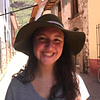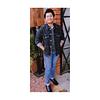Before the Paris terrorist attacks in 2015, I was a proud Turkish little girl who always wanted to educate people on the food, traditions, clothes, etc. I loved going to school and seeing my friends greeting me at the door with the lego buildings they built while waiting for my car to appear. On the first day of school, I always knew teachers were going to call my name next when they would pause, look up, look back down at the roster, and say " I am sorry, but I'm gonna butcher the next name".
I knew that routine was my cue to step in and explain the phonetics of my name. After I would give my explanation for the 5 millionth time that day, they would ask where it is from.
Because I was proud of my name, I would tell them that Ela means hazel eyes in Turkish and that Eryilmaz means a soldier that never gives up. The teacher would always smile back, show a genuine interest in my culture, and ask questions about Islam which became a new normal. Although 9/11 happened, teachers and students wouldn't hold a grudge even though Turkey is 99% Muslim. After the Paris terrorist attacks in 2015, the accepting reactions of my teachers when I told them I was Turkish have seemed to change abruptly.
The old smile back, genuine interest in my culture, and questions about Islam soon turned to a wide eye-look, a bizarre awkward silence, always followed up with questions like, "You not going to commit [censored] against me because of I'm Christian right?" or " wow, are you as violent as those terrorists and the people who perpetrated [censored]?". Now, I wait to share my nationality with people, fearing that I will be seen as a violent, hateful person. Although I am not Muslim, people assume I am which shows me a little portion of what Muslims go through. Whether I am Muslim or not, I still face discrimination in my predominantly white town.
Let us slide into your dms 🥰
Get notified of top trending articles like this one every week! (we won't spam you)How Stereotypes Affected the Way I Preformed:
As a Turkish-American, I have been on the receiving end of microaggressions by teachers, students, and co-workers. I noticed that ever since the terrorist attacks, the stereotype that Muslims are violent have silenced me in my school career in regards to debates, standing up for myself and others, as well as my passion. In debates, when I make rebuttals I hear comments like, " She comes from a predominantly Muslim country which means we need to be careful in case she gets violent" which affects my effectiveness.
The people only seem to care about my ethnicity rather than what I am saying. When people don't take me seriously because I am from Turkey, they make it difficult for them to see my side. In their eyes, my ethnicity makes what I am saying invalid which leads to a dangerous hierarchy at school. Not only do we see this dangerous cycle in school, we see the consequences of the lack of representation in our government.
Over the years, I have noticed that people who are first-generation Americans are not seen as the stereotypical "American" person or not even seen as Americans. On top of not being seen as American, I come from a country that follows a certain religion that is seen as hateful, violent, and a way to abuse power. Hearing these comments used to hold me back from being a leader because I knew there would be people who thought I would abuse my power due to my extended family identifying as Muslim.
The microaggressions along with worrying about how I was perceived silenced my opinions, negatively impacted my ability to perform, and prevented me from participating in discussions. Not only have I been held back in debates, but I also struggled to stand up for myself.
Take the Quiz: Which Indian city is the perfect holiday spot for you!?
Let's match you with an Indian city that you would love!
A Frequent Experience:
Last year, I walked into my math class, as usual, to park my phone and go to the bathroom. When I came back from the bathroom, I had two white boys come up to me and they tried to speak Arabic. In the midst of the boys mocking Arabic, they would reference 9/11 and the Paris attacks in English and then go back to "speaking" Arabic.
Everyone in the class laughed thinking it was a harmless joke and started to take out the homework from the night before. Even though in Turkey we speak Turkish, the boys displayed their ignorance about the country which made me want to stand up for myself.
I was caught up in trying to show the class that people from a predominantly Muslim country can be calm so I bit my tongue. I also thought that if I said something, I would be perceived as hateful towards Americans. As I look back on my experience, I regret not speaking up.
I regret thinking that me defending myself would be seen as "hateful" or not "proper". I wish I would've educated the boys, showed them the consequences of their "joke", and offer resources for them to consider reading.
The Travel Ban:
The travel ban banned individuals from seven predominantly Muslim countries sending the message that Muslims don't belong in America. People who look to our administration are developing the mindset that Muslims are not safe. The closed mindset stops Muslims from contributing to American society and marginalizes individuals from predominately Muslim countries.
Muslims coming to America did not endanger America's safety. The ban did. The hate crimes against immigrants and Muslims continue to grow with our president saying outlandish things about both groups. Because I am a daughter of two Turkish immigrants who are currently living out the American Dream, I have experienced comments about putting America in "harm's" way.
As a person whose extended family identifies as Muslims, I think about all the life lessons my grandfather taught me, the strength my grandmother shows, the encouragement my aunt gives me, the life long friendship my cousins give me, the wise words my uncle has shared with me, and the determination my grandmother's sister instilled in. Nothing in what I listed seems dangerous, violent, or hateful. I also think of the doctors, lawyers, engineers, farmers, accountants, translators, and sailors in my family who positively contribute to society.
My Outlook on Myself:
Although I receive microaggressions and comments about my parents' home country, I have been able to use my experiences to speak out against Islamophobia and joined a political campaign to advocate for immigrants. I believe my background empowers me to communicate with people from different cultures, empathize with people in a way others can't, look at topics from different perspectives, and develop qualities I wouldn't have been able to obtain if it weren’t for my Muslim relatives.
My parents wouldn't have had the opportunity to get their master’s degree in America if it weren't for their Muslim parents. I wouldn’t have the opportunity to share my experiences if it wasn’t for my Muslim relatives encouraging me to speak out against social injustice. Even after all the offensive jokes, stereotypes, and microaggressions, I am proud to be a young woman from a predominantly Muslim country.














